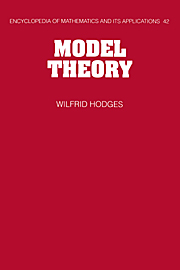Book contents
- Frontmatter
- Contents
- Introduction
- Note on notation
- 1 Naming of parts
- 2 Classifying structures
- 3 Structures that look alike
- 4 Automorphisms
- 5 Interpretations
- 6 The first-order case: compactness
- 7 The countable case
- 8 The existential case
- 9 The Horn case: products
- 10 Saturation
- 11 Combinatorics
- 12 Expansions and categoricity
- Appendix: Examples
- References
- Index to symbols
- Index
7 - The countable case
Published online by Cambridge University Press: 08 October 2009
- Frontmatter
- Contents
- Introduction
- Note on notation
- 1 Naming of parts
- 2 Classifying structures
- 3 Structures that look alike
- 4 Automorphisms
- 5 Interpretations
- 6 The first-order case: compactness
- 7 The countable case
- 8 The existential case
- 9 The Horn case: products
- 10 Saturation
- 11 Combinatorics
- 12 Expansions and categoricity
- Appendix: Examples
- References
- Index to symbols
- Index
Summary
For eighthly he rubs himself against a post.
For ninthly he looks up for his instructions.
For tenthly he goes in quest of food.
Christopher Smart (1722–71), Jubilate Agno.The cardinal number ω is the only infinite cardinal which is a limit of finite cardinals. This gives us two reasons why countable structures are good to build. First, a countable structure can be built as the union of a chain of finite pieces. And second, we have infinitely many chances to make sure that the right pieces go in. No other cardinal allows us this amount of control.
So it's not surprising that model theory has a rich array of methods for constructing countable structures. Pride of place goes to Roland Fraïssé's majestic construction, which bestrides this chapter. Next comes the omitting types construction (section 7.2); it was discovered in several forms by several people. At heart it is a Baire category argument, the same as in model-theoretic forcing (section 8.2 below). I once wrote a book (Hodges [1985]) about the dozen or so variants of forcing which appear in model theory.
There is another countable construction whose roots lie rather deeper in descriptive set theory – namely the construction which proves that the ordinal ω1 is not definable by any sentence of Lω1ω. But the uncountable analogues of this construction are just as important as the countable case, and so I have postponed it to section 11.5 below, where we shall be in a better position to use it.
- Type
- Chapter
- Information
- Model Theory , pp. 323 - 359Publisher: Cambridge University PressPrint publication year: 1993
- 1
- Cited by



